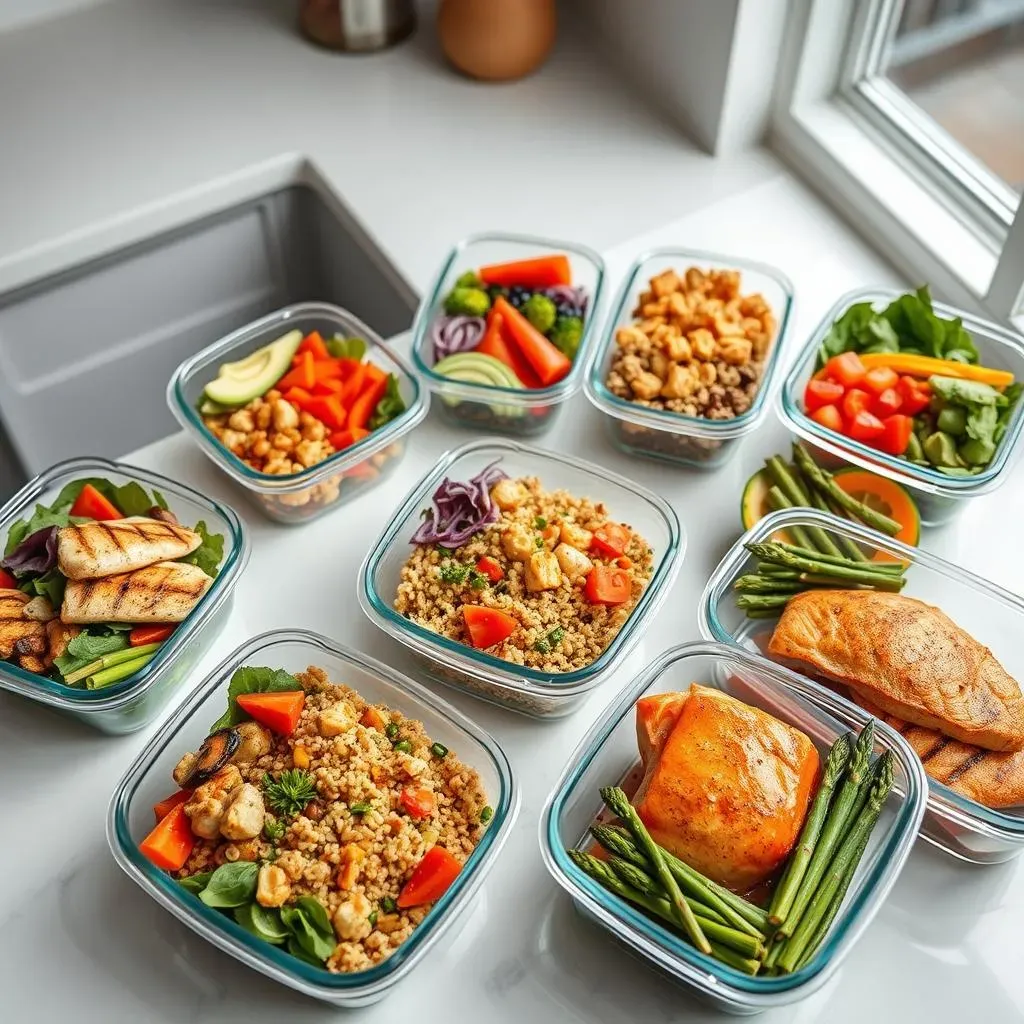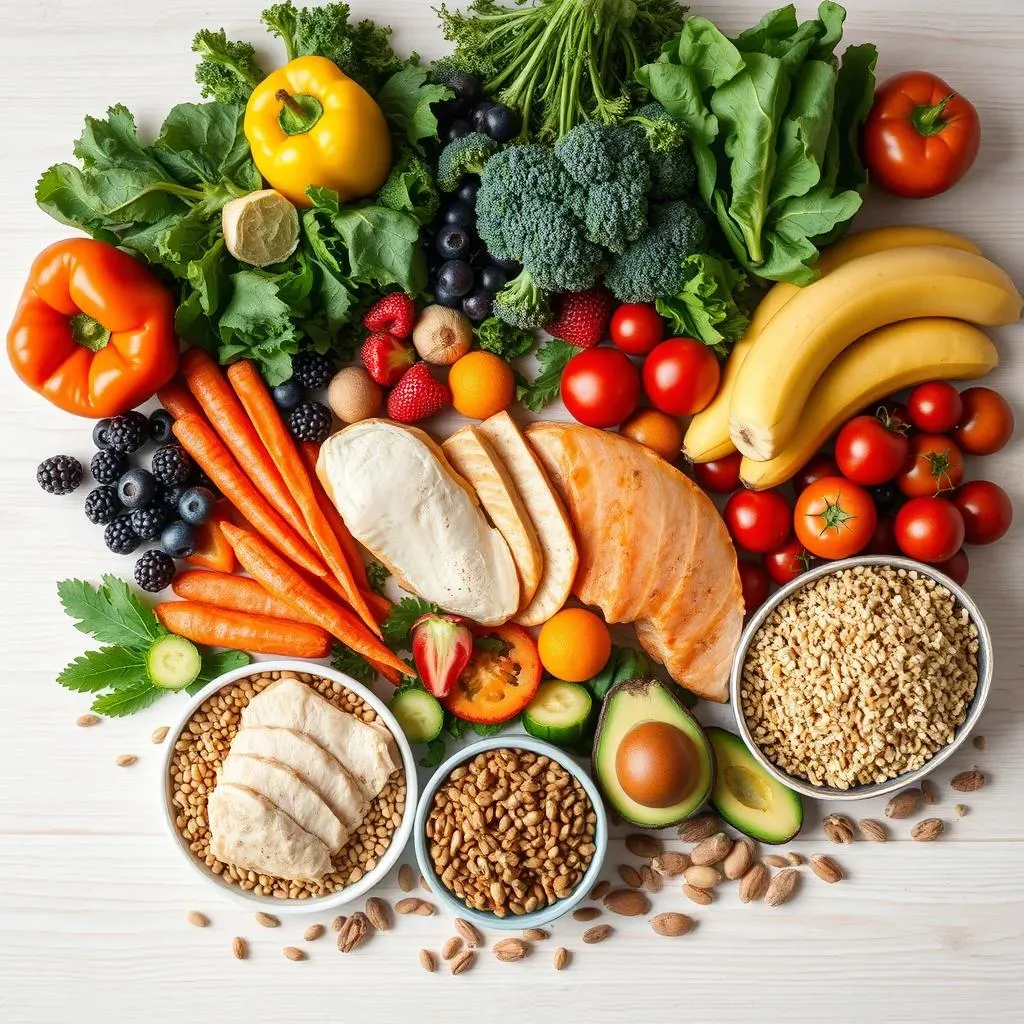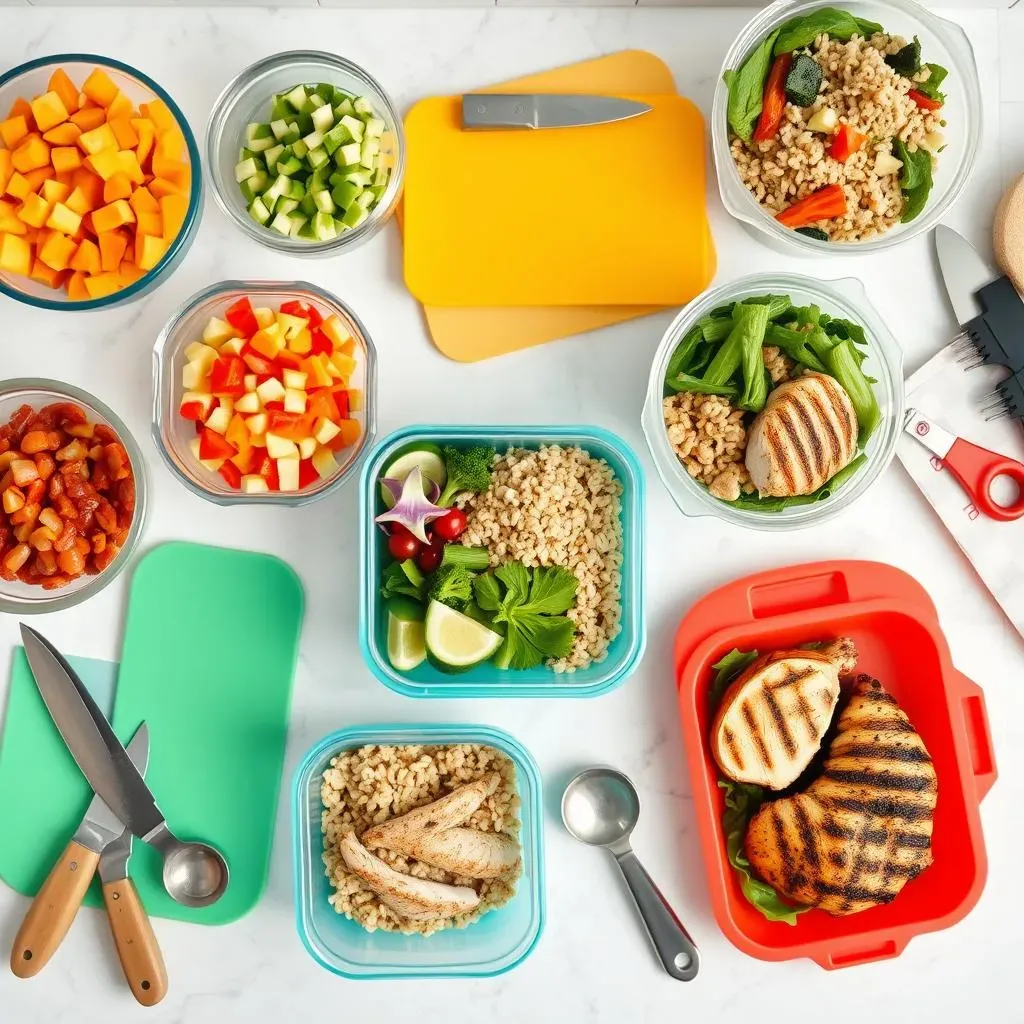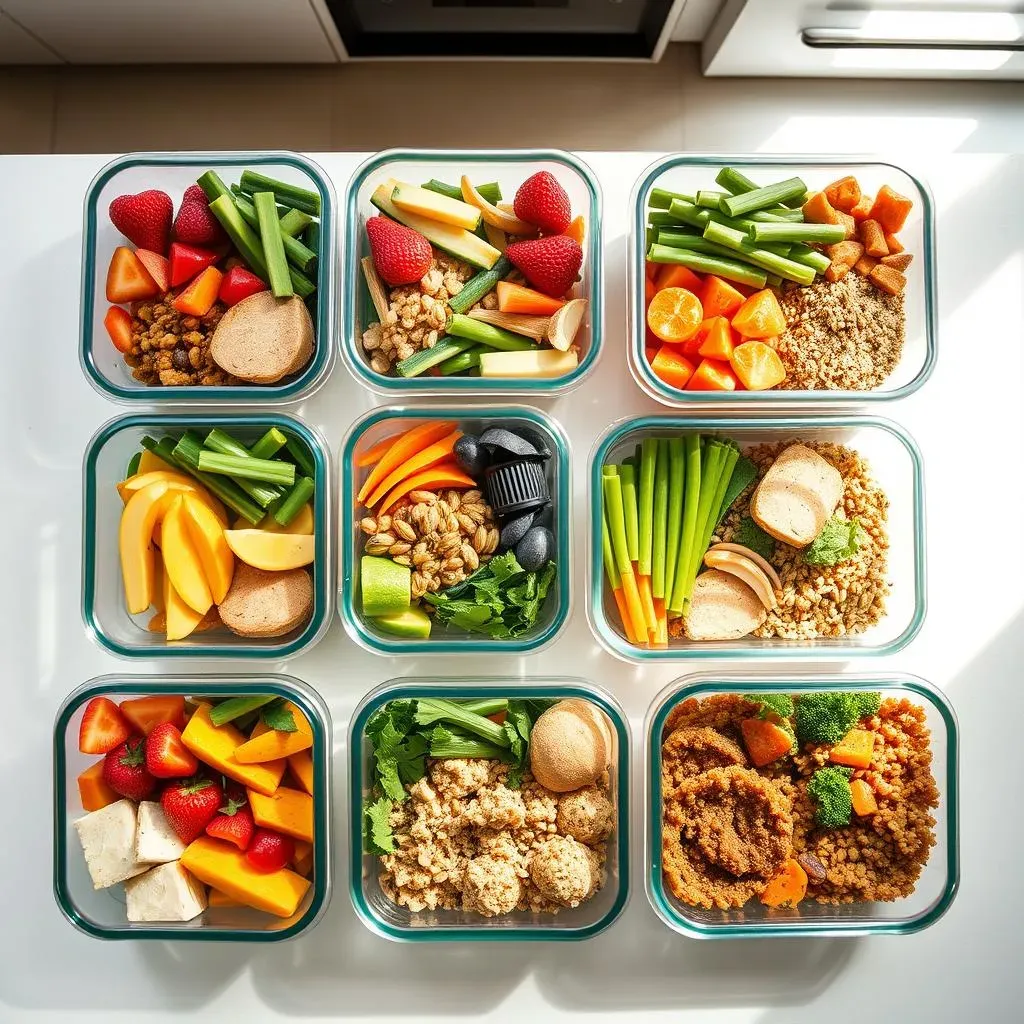Table of Contents
Feeling like healthy eating is a constant battle against the clock? You're not alone. Between work, family, and everything else life throws your way, finding the time to whip up nutritious meals can feel impossible. But what if I told you that a week of delicious, good-for-you food could be within your reach, without spending hours in the kitchen? This guide is your ticket to effortless eating with a carefully curated plan for 7 healthy meals for the week.
Why This 7 Healthy Meals for the Week Plan Works

Why This 7 Healthy Meals for the Week Plan Works
Let's be real, there are a million meal plans out there. So, what makes this one different? It's all about sustainability and real-life application. This isn't some restrictive diet that leaves you feeling deprived and reaching for the nearest bag of chips by day three. This 7 healthy meals for the week plan is designed to be flexible, adaptable, and, most importantly, enjoyable. It focuses on whole, unprocessed foods that nourish your body from the inside out, giving you sustained energy and helping you feel your best. It's about building healthy habits, not just following a rigid set of rules.
MustHave Healthy Foods to Focus On This Week

MustHave Healthy Foods to Focus On This Week
Alright, let's talk staples. If you're aiming for 7 healthy meals for the week, you'll want to stock up on these nutritional powerhouses. Think of it as building a healthy eating arsenal. We're talking vibrant fruits and vegetables bursting with vitamins, lean proteins to keep you satisfied, whole grains for sustained energy, and healthy fats to support overall well-being. Don't worry, this isn't about deprivation; it's about abundance! It is about fueling your body with the good stuff. Trust me, once you start incorporating these into your daily routine, you'll feel the difference.
- Leafy Greens: Spinach, kale, romaine lettuce – the more, the merrier!
- Colorful Veggies: Bell peppers, broccoli, carrots, tomatoes – load up on variety.
- Fruits: Berries, apples, bananas, oranges – nature's candy.
- Lean Proteins: Chicken breast, turkey, fish, beans, lentils, tofu – essential for muscle building and satiety.
- Whole Grains: Brown rice, quinoa, oats, whole-wheat bread – complex carbs for sustained energy.
- Healthy Fats: Avocados, nuts, seeds, olive oil – crucial for brain health and hormone balance.
Prep Like a Pro: MealPrepping for Your Week of Healthy Meals

Prep Like a Pro: MealPrepping for Your Week of Healthy Meals
The Power of Prep: Why Bother?
I get it. The words "meal prep" can conjure images of endless Tupperware containers and a Sunday afternoon spent chained to the stove. But trust me, a little planning goes a long way, especially when you're aiming for 7 healthy meals for the week. Meal prepping isn't about perfection; it's about making healthy choices more convenient. It's about setting yourself up for success, so when those busy weeknights roll around, you're not reaching for takeout. Think of it as an investment in your health and your sanity.
It's about reclaiming your time and energy. By dedicating a few hours to prepping ingredients or even entire meals, you're freeing yourself from the daily "what's for dinner?" dilemma. You'll save money by avoiding impulse purchases and restaurant meals. Plus, you'll have complete control over what you're eating, ensuring you're nourishing your body with wholesome, delicious foods. So, ditch the dread and embrace the power of prep!
Smart Strategies for Meal Prep Success
So, where do you even begin? Don't feel overwhelmed. Start small and build from there. The key is to find a system that works for you and your lifestyle. Maybe it's prepping all your lunches on Sunday, or chopping veggies for dinner throughout the week. The goal is to make it manageable and sustainable. Here are a few tried-and-true strategies to get you started on your journey to 7 healthy meals for the week:
- Plan Your Menu: This is crucial! Look at your schedule and decide what meals you need to prep.
- Make a Grocery List: Stick to your list to avoid impulse buys.
- Choose a Prep Day: Sunday is popular, but any day that works for you is fine.
- Batch Cook: Cook large quantities of grains, proteins, and veggies.
- Portion it Out: Divide your prepped food into individual containers.
- Store Properly: Use airtight containers and label everything with the date.
Essential Meal Prep Tools
Having the right tools can make all the difference in your meal prep experience. You don't need to go out and buy a ton of fancy gadgets, but a few key items can streamline the process and make it more efficient. Consider these essentials when embarking on your quest for 7 healthy meals for the week:
Tool | Why You Need It |
|---|---|
Sharp Knives | For efficient chopping and dicing. |
Cutting Boards | Protect your countertops and provide a stable surface. |
Airtight Containers | Keep your food fresh and prevent leaks. |
Large Pots and Pans | For batch cooking grains, soups, and stews. |
Food Scale | For accurate portioning (optional). |
With a little planning and the right tools, you can transform your kitchen into a meal prep powerhouse. Remember, it's about progress, not perfection. Start small, experiment with different techniques, and find what works best for you. Soon, you'll be enjoying delicious, healthy meals all week long, without the stress and hassle.
Your Delicious 7 Healthy Meals for the Week: The Detailed Plan

Your Delicious 7 Healthy Meals for the Week: The Detailed Plan
Alright, let's get to the good stuff! This is where we lay out your delicious, doable plan for 7 healthy meals for the week. Remember, this is a template, not a prison sentence. Feel free to swap meals around, adjust portion sizes, and add your own personal touches. The goal is to make this work for you. Each day includes suggestions for breakfast, lunch, dinner, and a snack to keep you fueled and satisfied. Get ready to say goodbye to mealtime stress and hello to a week of healthy, happy eating!
Day 1
- Breakfast: Oatmeal with berries and nuts
- Lunch: Salad with grilled chicken or chickpeas
- Dinner: Baked salmon with roasted vegetables
- Snack: Greek yogurt with fruit
Day 2
- Breakfast: Smoothie with spinach, banana, and protein powder
- Lunch: Leftover baked salmon and roasted vegetables
- Dinner: Turkey meatballs with whole-wheat pasta and marinara sauce
- Snack: Apple slices with almond butter
Day 3
- Breakfast: Whole-wheat toast with avocado and egg
- Lunch: Turkey meatball subs on whole-wheat rolls
- Dinner: Chicken stir-fry with brown rice
- Snack: Handful of almonds
Day 4
- Breakfast: Yogurt parfait with granola and fruit
- Lunch: Leftover chicken stir-fry
- Dinner: Lentil soup with whole-grain bread
- Snack: Baby carrots with hummus
Day 5
- Breakfast: Scrambled eggs with veggies
- Lunch: Leftover lentil soup
- Dinner: Pizza on whole wheat crust with lots of veggies
- Snack: Cottage cheese with pineapple
Day 6
- Breakfast: Breakfast burrito with egg, beans, and salsa
- Lunch: Salad with grilled chicken
- Dinner: Tacos with ground turkey and all the fixings
- Snack: Banana
Day 7
- Breakfast: Pancakes on whole wheat with syrup and fruit
- Lunch: Leftover tacos
- Dinner: Roasted chicken with potatoes and green beans
- Snack: Rice cakes with peanut butter
FAQs: Mastering Your Healthy Eating Routine

FAQs: Mastering Your Healthy Eating Routine
Is calorie counting necessary for this plan?
Not necessarily! While some people find calorie counting helpful, it's not essential for success with this 7 healthy meals for the week plan. The focus is on eating whole, unprocessed foods in reasonable portions. Pay attention to your hunger and fullness cues. Eat when you're hungry, and stop when you're satisfied. If you're consistently undereating or overeating, you may want to adjust your portion sizes accordingly. However, for many people, simply focusing on the quality of their food and listening to their body is enough to achieve their health goals.
Think of it this way: would you rather eat 300 calories of processed junk food or 300 calories of a nutrient-packed salad with grilled chicken? The salad will keep you fuller longer, provide essential vitamins and minerals, and support your overall health. Calorie counting can be a useful tool, but it shouldn't be the sole focus. It is better to focus on the types of food you’re consuming and how those foods make you feel. Healthy eating should feel sustainable and enjoyable, not restrictive and stressful.
Can I customize this meal plan to fit my dietary needs?
Absolutely! This 7 healthy meals for the week plan is designed to be a template, not a rigid set of rules. Feel free to swap out meals, adjust portion sizes, and incorporate your favorite healthy foods. If you're vegetarian or vegan, simply replace the animal-based protein sources with plant-based alternatives like tofu, tempeh, lentils, or beans. If you have food allergies or sensitivities, be sure to read labels carefully and avoid any ingredients that trigger a reaction. The most important thing is to create a meal plan that works for you and your individual needs.
For example, if you're gluten-free, you can easily swap out the whole-wheat pasta for a gluten-free alternative like brown rice pasta or quinoa pasta. If you're dairy-free, you can use almond milk or coconut milk instead of cow's milk. Don't be afraid to experiment and get creative in the kitchen! The more you customize the plan to your liking, the more likely you are to stick with it long-term. Remember, healthy eating is a journey, not a destination. It’s about finding a sustainable and enjoyable way to nourish your body.
Dietary Need | Adaptation |
|---|---|
Vegetarian | Replace meat with tofu, tempeh, lentils, or beans. |
Vegan | Replace meat and dairy with plant-based alternatives. |
Gluten-Free | Use gluten-free grains and products. |
Dairy-Free | Use almond milk, coconut milk, or other dairy-free alternatives. |
Wrapping Up Your Week of Healthy Eating
So, there you have it – a complete guide to conquering your week with 7 healthy meals. Remember, this plan is a starting point, not a rigid set of rules. Feel free to mix and match meals, swap out ingredients based on your preferences, and adjust portion sizes to suit your individual needs. The most important thing is to listen to your body, enjoy the process, and make healthy eating a sustainable part of your lifestyle. Here's to a week of delicious, nutritious meals and a happier, healthier you!